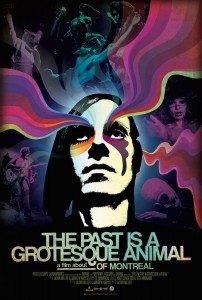
 This week saw the conclusion of Brooklyn’s Northside Festival, which is best known for its music but also hosts a growing film program. Now in its fifth year, the festival featured a wildly eclectic mix of films; like its host borough, the lineup was sometimes trying too self-consciously to be eclectic, but there were some winners in the mix. Here’s a quick look at some of the featured films.
This week saw the conclusion of Brooklyn’s Northside Festival, which is best known for its music but also hosts a growing film program. Now in its fifth year, the festival featured a wildly eclectic mix of films; like its host borough, the lineup was sometimes trying too self-consciously to be eclectic, but there were some winners in the mix. Here’s a quick look at some of the featured films.
"The Past is a Grotesque Animal": The psychedelic world of the band Of Montreal, and their enigmatic bandleader Kevin Barnes, comes to life in this new music documentary. Fans of the band will love seeing the evolution of not only their music, but also their notorious live show, a kaleidoscopic mix of vaudeville, performance art, and absurd humor. The film chronicles some of the usual band drama – lineup changes, exhausting tours, creative conflict– but not much is actually captured by the cameras, mostly we’re being told about it after the fact. The strongest part of the film details how, following a split with his wife and child, Barnes began to integrate his emotional turmoil into their breakthrough album, "Hissing Fauna, Are you the Destroyer?" The narrative focus is Kevin Barnes’ relentless creativity and his willingness to sacrifice personal relationships in his pursuit of art, but the film admirably shows both the fruits and the emotional fallout of his single-minded artistic drive. The reliance on telling instead of showing keeps the film from entering the realm of truly classic music docs, but it will delight Of Montreal fans and is a great document of constant artistic evolution over more than a decade.
"Ne Me Quitte Pas": An incredible documentary that, if I hadn’t been told, I never would have guessed was a documentary due to its artful cinematography that shows moments so raw and unguarded it’s painful to know they’re real. Unlike most American documentaries, which rely on a hook or agenda that tells the viewer what to expect, this unpredictable Dutch-Belgian import starts with two seemingly average men and peels back layer after layer until we’re confronted with existential pain both personal and universal. Bob and Marcel are lonely alcoholics for whom life is measured not in days and weeks but ounces and liters. They talk about their failures and sorrows with a European frankness, finding solace in each others' company and the oblivion of alcohol. An epigraph from Beckett gives an appropriate frame to the story, which is often funny, but in a soul shattering, gazing into the abyss way. We interviewed the directors during the Tribeca Film Festival, click here to read.
 "Homemakers": We loved this wild new film that made its New York premiere at the festival - check out our full review here.
"Homemakers": We loved this wild new film that made its New York premiere at the festival - check out our full review here.
"Downloaded": This documentary showcases the meteoric rise and fall of Napster, a simple piece of software that helped change the way we experience music forever. The doc is energetically made and does a good job of showing the phenomenon from all angles while telling the variety of stories involved. There’s the overnight success story of two teenagers, Sean Fanning and Sean Parker, who went from living under desks to the cover of Time in a matter of months. There’s the legal drama, pitting those teenagers against a gigantic industry with unlimited resources and representatives like Dr. Dre and Metallica fighting them in the press. But the real story here is in the background of the personalities and rhetoric. It’s the story of a paradigm shift, of how technology changed the way anyone under 30 interfaced with the world, especially culture. Today Napster may feel like a colorful footnote, but it was the seed that many of today’s most popular companies sprouted from, and understanding Napster is vital to understanding tech today.
"Forty Years From Yesterday": This is a quiet, meditative film about coping with death. Whereas most films contextualize someone’s life as much as possible to give an emotional connection to the deceased, this film simply shows the aftermath of a death that’s in no way extraordinary, but is accessible for how commonplace it is. The shattering effect of the death on the husband of the deceased is juxtaposed with the banality felt by funeral home workers as they take the body away and prepare it, just one of many that they treat the same way. The film has some powerful moments, but ultimately is too quiet and slow for its own good, losing the viewer’s interest amongst the endless mundane aspects of funeral planning.